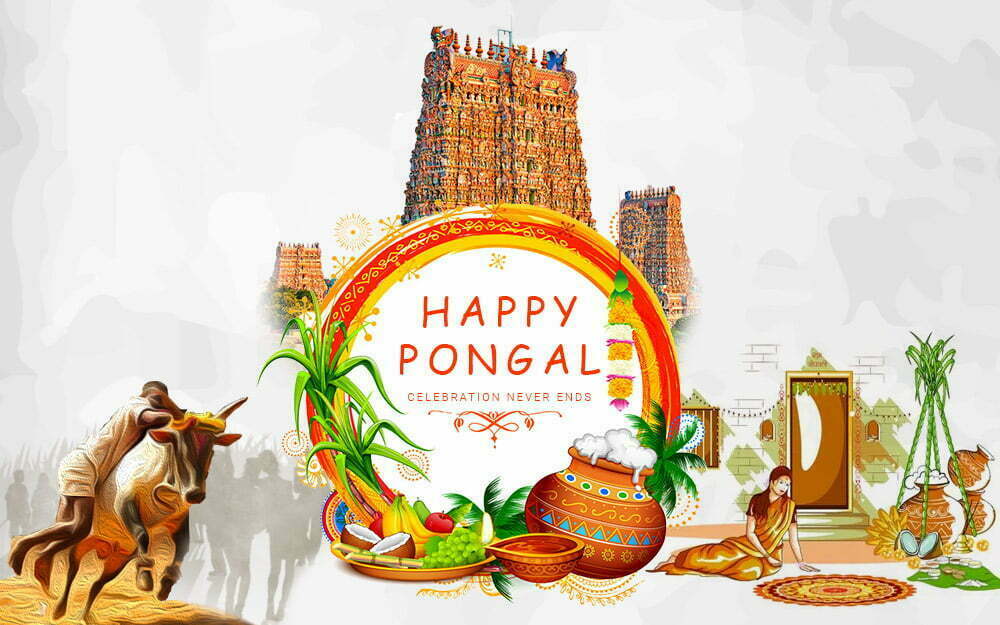Pongal Festival 2023: History of the Harvest Festival

Pongal festival is one of the most significant harvest traditions, connected with the southern Indian subcontinent and celebrated by the community worldwide. It honours the auspicious start of Uttarayan, which marks the start of the sun’s journey northward. This four-day event is traditionally held in mid-January, during the month of ‘Thai,’ when staple crops such as rice are harvested, to express thanks to Mother Nature.
This year of 2023’s harvest celebration will begin on the dates of January 14 and will remain through January 17. Pongal literally means “spilling over,” and it derives its name from cooking rice in a pot until it begins to overflow. That also represents the sun’s progressive heating of the Earth.
History of the Pongal Festival
India is a land of festivals. In India, people celebrate every festival with morale. Pongal, The Harvest Festival of Tamil Nadu, is one such festival. The term ‘Pongal’ is from Tamil literature which means “to boil”. It is an ancient festival of harvest celebrated in Tamil Nadu during the solar equinox. After harvesting the crops like rice, sugarcane, turmeric, etc. The trace of the Tamil Pongal festival history is from the Sangam age (i.e.) 200 BC – 380 AD. Although, Pongal originated as a Dravidian Harvest Festival. Historians recognize the festival with the Thai Un and Thai Niradal, believed to have been celebrated on this same day during the Sangam age. According to traditional stories, during this festive season, unmarried girls pray for the agricultural prosperity of the country. In addition, they observed penance during the Tamil month of Margazhi. The Pongal festival is a four-day celebration event.
Bhogi Pandigai
On the first day of the festival, people celebrate Bhogi in honour of Lord Indra, the God of Rains and the Lord of Lords. In the Bhogi festival, useless household items are tossed into a bonfire traditionally made of cow dung cakes and wood.
Thai Pongal Festival
The second day, Thai Pongal, is the first day of the Tamil month, Thai. On this day, people perform a special ritual. That is, placing a fresh clay pot over the stove, in an open area. People cook rice with milk and jaggery to make Pongal, which is sweet Pongal (sakkarai Pongal). Moreover, people also offer sugarcane sticks, coconuts and bananas. Another important aspect of this day of Pongal is the Kolam. The traditional design is hand-drawn at the entrances of the houses with lime powder. Women draw this auspicious drawing early in the morning to welcome Goddess Lakshmi.
Maattu Pongal
On the third day, Maattu Pongal, the day celebrated in the name of cows. The owner of the cattle bathes them and beautifully decorates their cattle. People decorate their horns, wrap the garland around them and apply tilak to their foreheads. Finally, People would serve Pongal to animals. Farmers enjoy taking their farm animals on a tour around the entire community.
The reason behind the celebration of the Maattu Pongal festival
The traditional stories say that Lord Shiva had once sent his bull, Basava, to earth with a message for the mortals. Ask them to have an oil massage and bath daily and eat once a month. However, Basava mistakenly announced that Lord Shiva asked the people to eat daily and have an oil bath once a month. Later, Lord Shiva banished Basava to the earth forever, cursing he would have to help the people by ploughing the field. So, the people can produce more food.
Kaanum Pongal
The fourth day is the Kaanum Pongal marks the last day of the Tamil Pongal celebration. On this day, people perform a special ritual, where the leftover sweet Pongal (sakkarai Pongal) and other food are set in the courtyard on a washed turmeric leaf along with betel leaves, betel nuts and sugarcane. Women of the household carry out this ritual in the name of their brothers asking for their prosperity. The word “Kaanum” means “to see”. Hence, people will go to their relative’s houses or entertainment places to celebrate this day.
Happy Pongal 2023
Wish you a happy and prosperous Pongal
For more interesting news and facts, check out our blog New Facts World and follow us on Instagram.




Happy Pongal to all